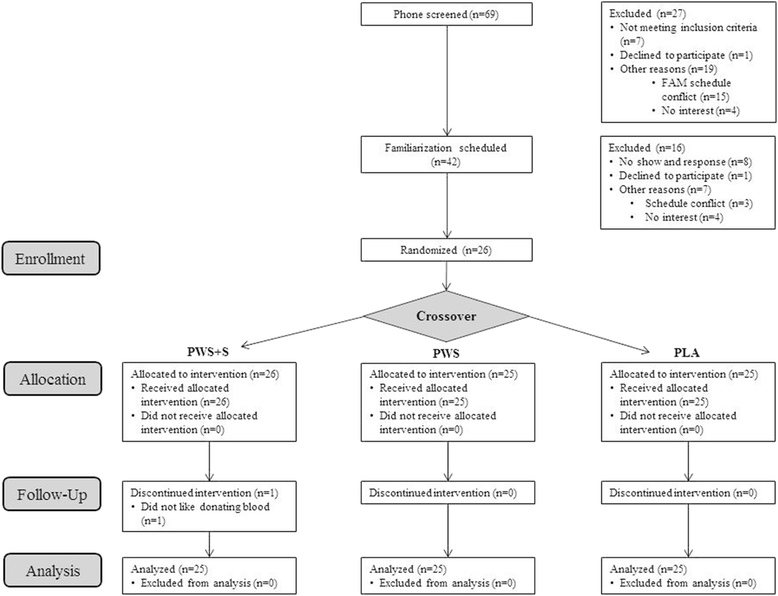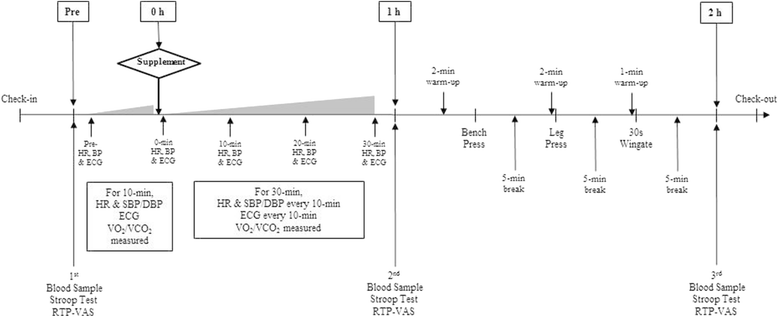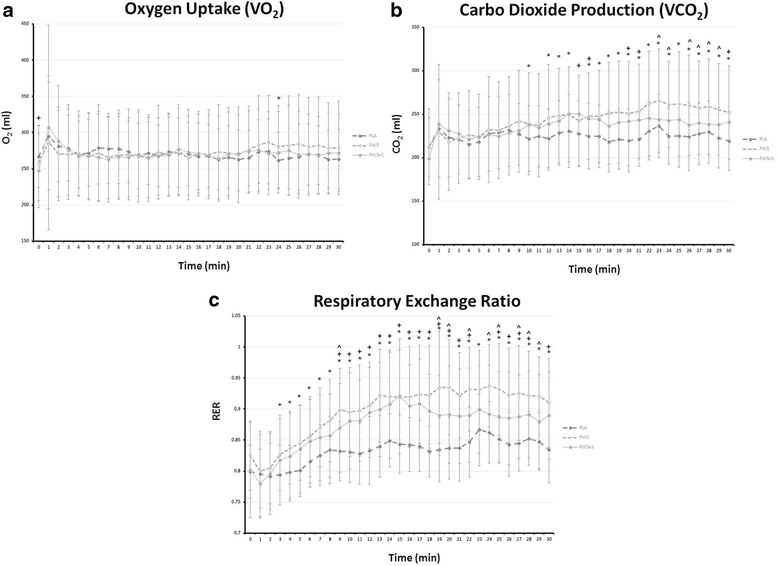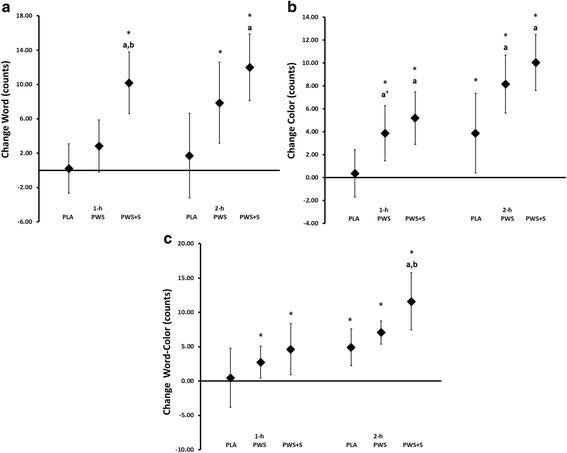Effects of acute ingestion of a pre-workout dietary supplement with and without p- synephrine on resting energy expenditure, cognitive function and exercise performance - PubMed (original) (raw)
Randomized Controlled Trial
Effects of acute ingestion of a pre-workout dietary supplement with and without p- synephrine on resting energy expenditure, cognitive function and exercise performance
Y Peter Jung et al. J Int Soc Sports Nutr. 2017.
Abstract
Background: The purpose of this study was to examine the effects of acute ingestion of a pre-workout dietary supplement (PWS) with and without _p-_synephrine (S) on perceptions of readiness to perform, cognitive function, exercise performance, and markers of safety.
Methods: In a randomized, double-blind, and counterbalanced manner; 25 healthy and recreationally active male and female participants ingested a flavored maltodextrin placebo (PLA), a PWS containing beta-alanine (3 g), creatine nitrate as a salt (2 g), arginine alpha-ketoglutarate (2 g), N-Acetyl-L-Tyrosine (300 mg), caffeine (284 mg), Mucuna pruiriens extract standardized for 15% L-Dopa (15 mg), Vitamin C as Ascorbic Acid (500 mg), niacin (60 mg), folate as folic acid (50 mg), and Vitamin B12 as Methylcobalamin (70 mg) with 2 g of maltodextrin and flavoring; or, the PWS with Citrus aurantium (PWS + S) extract standardized for 30% _p_-synephrine (20 mg). Participants had heart rate (HR), blood pressure, resting energy expenditure (REE), 12-lead electrocardiograms (ECG), perceptions about readiness to perform, cognitive function (Stroop Color-Word test), bench and leg press performance (2 sets of 10 repetitions at 70% of 1RM and 1 set to failure), and Wingate anaerobic capacity (WAC) sprint performance determined as well as donated blood samples prior to and/or following exercise/supplementation. Data were analyzed by MANOVA with repeated measures as well as mean changes from baseline with 95% confidence intervals (CI).
Results: No clinically significant differences were observed among treatments in HR, blood pressure, ECG, or general clinical blood panels. There was evidence that PWS and PWS + S ingestion promoted greater changes in REE responses. Participants reported higher perception of optimism about performance and vigor and energy with PWS and PWS + S ingestion and there was evidence that PWS and PWS + S improved changes in cognitive function scores from baseline to a greater degree than PLA after 1 or 2 h. However, the scores in the PWS + S treatment did not exceed PLA or PWS responses at any data point. No statistically significant differences were observed among treatments in total bench press lifting volume, leg press lifting volume or WAC sprint performance.
Conclusions: Within the confines of this study, ingestion of PWS and/or PWS + S prior to exercise appears to be well-tolerated when consumed by young, healthy individuals. The primary effects appear to be to increase REE responses and improve perceptions about readiness to perform and cognitive function with limited to no effects on muscular endurance and WAC. The addition of 20 mg of _p_-synephrine to the PWS provided limited to no additive benefits.
Trial registration: This trial (NCT02952014) was retrospectively registered on September 13th 2016.
Keywords: Dietary Supplement; Energy Drinks; Ergogenic Aids.
Figures
Fig. 1
CONSORT schematic of enrollment and treatment allocation to the study
Fig. 2
Study timeline
Fig. 3
Oxygen update (Panel a), carbon dioxide production (Panel b), and respiratory exchange ratio values (Panel c) observed during the first 30-min following supplementation. Data are mean ± SD. ^ represents p < 0.05 difference between PLA and PWS; + represents p < 0.05 difference between PLA and PWS + S; and, * represents p < 0.05 difference between PWS and PWS + S
Fig. 4
Changes in Stroop Word (Panel a), Color (Panel b), and Word-Color (Panel c) counts. Data are mean change and 95% CI. * represents p < 0.05 difference from baseline, a = _p_ < 0.05 from PLA, b = _p_ < 0.05 from PWS, c = _p_ < 0.05 difference from PWS + S. † represents _p_ > 0.05 to p < 0.10 difference
Similar articles
- Effects of ingesting a pre-workout dietary supplement with and without synephrine for 8 weeks on training adaptations in resistance-trained males.
Jung YP, Earnest CP, Koozehchian M, Cho M, Barringer N, Walker D, Rasmussen C, Greenwood M, Murano PS, Kreider RB. Jung YP, et al. J Int Soc Sports Nutr. 2017 Jan 3;14:1. doi: 10.1186/s12970-016-0158-3. eCollection 2017. J Int Soc Sports Nutr. 2017. PMID: 28096757 Free PMC article. Clinical Trial. - Short-Term Effects of a Ready-to-Drink Pre-Workout Beverage on Exercise Performance and Recovery.
Collins PB, Earnest CP, Dalton RL, Sowinski RJ, Grubic TJ, Favot CJ, Coletta AM, Rasmussen C, Greenwood M, Kreider RB. Collins PB, et al. Nutrients. 2017 Aug 1;9(8):823. doi: 10.3390/nu9080823. Nutrients. 2017. PMID: 28763003 Free PMC article. Clinical Trial. - The effects of supplementation with P-Synephrine alone and in combination with caffeine on resistance exercise performance.
Ratamess NA, Bush JA, Kang J, Kraemer WJ, Stohs SJ, Nocera VG, Leise MD, Diamond KB, Faigenbaum AD. Ratamess NA, et al. J Int Soc Sports Nutr. 2015 Sep 17;12:35. doi: 10.1186/s12970-015-0096-5. eCollection 2015. J Int Soc Sports Nutr. 2015. PMID: 26388707 Free PMC article. Clinical Trial. - Multi-ingredient pre-workout supplements, safety implications, and performance outcomes: a brief review.
Harty PS, Zabriskie HA, Erickson JL, Molling PE, Kerksick CM, Jagim AR. Harty PS, et al. J Int Soc Sports Nutr. 2018 Aug 8;15(1):41. doi: 10.1186/s12970-018-0247-6. J Int Soc Sports Nutr. 2018. PMID: 30089501 Free PMC article. Review. - International society of sports nutrition position stand: caffeine and exercise performance.
Guest NS, VanDusseldorp TA, Nelson MT, Grgic J, Schoenfeld BJ, Jenkins NDM, Arent SM, Antonio J, Stout JR, Trexler ET, Smith-Ryan AE, Goldstein ER, Kalman DS, Campbell BI. Guest NS, et al. J Int Soc Sports Nutr. 2021 Jan 2;18(1):1. doi: 10.1186/s12970-020-00383-4. J Int Soc Sports Nutr. 2021. PMID: 33388079 Free PMC article. Review.
Cited by
- Effects of two pre-workout supplements on concentric and eccentric force production during lower body resistance exercise in males and females: a counterbalanced, double-blind, placebo-controlled trial.
Tinsley GM, Hamm MA, Hurtado AK, Cross AG, Pineda JG, Martin AY, Uribe VA, Palmer TB. Tinsley GM, et al. J Int Soc Sports Nutr. 2017 Nov 28;14:46. doi: 10.1186/s12970-017-0203-x. eCollection 2017. J Int Soc Sports Nutr. 2017. PMID: 29209154 Free PMC article. Clinical Trial. - Acute effects of multi-ingredient pre-workout dietary supplement on anaerobic performance in untrained men: a randomized, crossover, single blind study.
Drwal A, Pałka T, Tota L, Wiecha S, Čech P, Strzała M, Maciejczyk M. Drwal A, et al. BMC Sports Sci Med Rehabil. 2024 Jun 9;16(1):128. doi: 10.1186/s13102-024-00918-1. BMC Sports Sci Med Rehabil. 2024. PMID: 38853269 Free PMC article. - Acute and Repeated Ashwagandha Supplementation Improves Markers of Cognitive Function and Mood.
Leonard M, Dickerson B, Estes L, Gonzalez DE, Jenkins V, Johnson S, Xing D, Yoo C, Ko J, Purpura M, Jäger R, Faries M, Kephart W, Sowinski R, Rasmussen CJ, Kreider RB. Leonard M, et al. Nutrients. 2024 Jun 8;16(12):1813. doi: 10.3390/nu16121813. Nutrients. 2024. PMID: 38931168 Free PMC article. Clinical Trial. - Efficacy of a nootropic spearmint extract on reactive agility: a randomized, double-blind, placebo-controlled, parallel trial.
Falcone PH, Tribby AC, Vogel RM, Joy JM, Moon JR, Slayton CA, Henigman MM, Lasrado JA, Lewis BJ, Fonseca BA, Nieman KM, Herrlinger KA. Falcone PH, et al. J Int Soc Sports Nutr. 2018 Dec 12;15(1):58. doi: 10.1186/s12970-018-0264-5. J Int Soc Sports Nutr. 2018. PMID: 30541572 Free PMC article. Clinical Trial. - Mechanistic Insights into the Neuroprotective Potential of Sacred Ficus Trees.
Shim KH, Sharma N, An SSA. Shim KH, et al. Nutrients. 2022 Nov 9;14(22):4731. doi: 10.3390/nu14224731. Nutrients. 2022. PMID: 36432418 Free PMC article. Review.
References
Publication types
MeSH terms
Substances
LinkOut - more resources
Full Text Sources
Other Literature Sources
Medical



